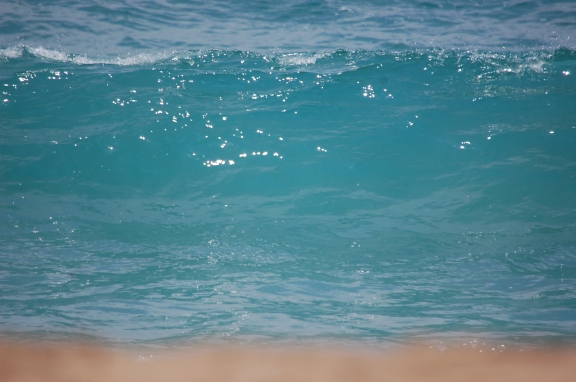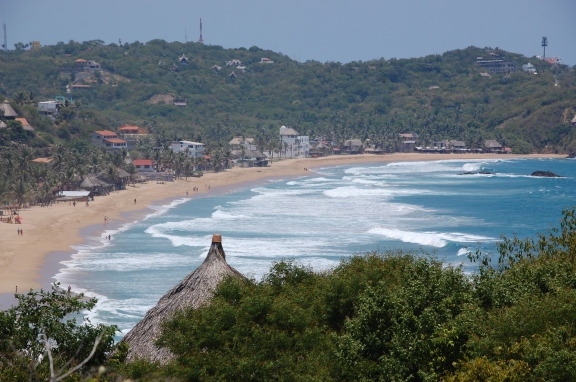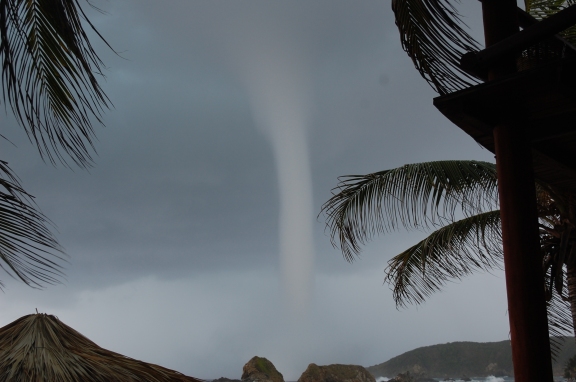| Zipolite
Viz: don't make the same mistake that we did in Zipolite. Like most tourist hotels and guesthouses we stay at in Mexico, the nudist colony happens to ...
|
"His mind, always gathering correspondences, thinks it has found a new one."
Tag: Zipolite
French nudists and freak tornados on the Oaxaca Coast

If you ever want to stay in a discreet nudist hotel, look out on Tripadvisor for codewords like ‘broadminded’, ‘especially for adults’ and ‘not child-friendly’. If you choose judiciously you may, upon walking through the door, be delighted – just like we weren’t – to see two French tourists splayed out in all their flaccid glory in the alfresco bar/reception area, umbrellas in their drinks and gallic pudenda making the most of the warm sea breeze*.
Conversely, if for some bizarre reason you don’t want to stay in such a place, do not choose places which are described as such. I.e: don’t make the same mistake that we did inZipolite.
Like most tourist hotels and guesthouses we stay at in Mexico, the nudist colony happens to be foreign-owned. In Puerto Escondido itself we stay at a place owned by a Swiss couple, and when we move on to Mazunte the proprietors turn out to be French. The actually quite charming nudist place belongs to an Italian who got halfway to learning Spanish and then got stranded out of his depth. He flounders between the two languages in a way that’s distressing to witness. I would happily dive in and save him, but then he isn’t wearing a swimming costume. Italians love this bit of the Oaxacan coast, because it was the setting (and ‘Puerto Escondido’ was the title) of a 1989 film about a guy from Milan who looks like a young Silvio Berlusconi getting mixed up in drug smuggling, partly because of a series of misunderstandings. It’s therefore possible that the owner of the hotel didn’t know he was starting a naturist colony. It’s also possible I misunderstood the film as I was watching it in Italian and at this point, after three months in Mexico with my Italian wife, Itañol is rapidly becoming my best second language.
Conversely, if for some bizarre reason you don’t want to stay in such a place, do not choose places which are described as such. I.e: don’t make the same mistake that we did inZipolite.
Like most tourist hotels and guesthouses we stay at in Mexico, the nudist colony happens to be foreign-owned. In Puerto Escondido itself we stay at a place owned by a Swiss couple, and when we move on to Mazunte the proprietors turn out to be French. The actually quite charming nudist place belongs to an Italian who got halfway to learning Spanish and then got stranded out of his depth. He flounders between the two languages in a way that’s distressing to witness. I would happily dive in and save him, but then he isn’t wearing a swimming costume. Italians love this bit of the Oaxacan coast, because it was the setting (and ‘Puerto Escondido’ was the title) of a 1989 film about a guy from Milan who looks like a young Silvio Berlusconi getting mixed up in drug smuggling, partly because of a series of misunderstandings. It’s therefore possible that the owner of the hotel didn’t know he was starting a naturist colony. It’s also possible I misunderstood the film as I was watching it in Italian and at this point, after three months in Mexico with my Italian wife, Itañol is rapidly becoming my best second language.
 It’s certainly warm enough to strip off. We’re at the top of a cliff and the heat and wind are immense. I have to keep covered up, I tell everyone, because I’m scared of getting badly sunburnt. It wouldn’t be the first time. If you really want to know just how painful excessive exposure to the sun can be, go to Tioman Island in Malaysia at the hottest time of the year and spend five straight hours in the sun, dismissing every attempt by your sister to get you to put some suncream on. It hit me three or so days later on the bus from Singapore to Kuala Lumpur: I was seized by an extremely insistent itching deep beneath my skin all over my chest, back and shoulders. Fearing that I might be having a heart attack brought on by excessive exposure to all the spiciest foods that Asia has to offer, I looked up the health bit of the Lonely Planet and learnt it was probably something called ‘prickly heat’, and that I should apply talcum powder asap. When I got to KL I ran like the wind to the nearest pharmacy, where to my relief I saw that they also sold something called ‘tiger balm’. The word ‘balm’ sounded soothing, like ‘calm’. Or ‘balsam’. Or ‘balsamico’. It doesn’t matter. It made it (at a generous estimate) about thirty times worse, and I spent my entire first, last and only evening in the Malaysian capital showering my torso with cold water. Which, in turned out, also made it worse. Over the next three days I became a gibbering monkey, incapable of more than ten seconds of conversation before I would have to go back to grimacing, scratching and at some points actually screeching. I never got to the point of stealing cameras and throwing my excrement at tourists, but I can tell you it was a pretty close shave.
It’s certainly warm enough to strip off. We’re at the top of a cliff and the heat and wind are immense. I have to keep covered up, I tell everyone, because I’m scared of getting badly sunburnt. It wouldn’t be the first time. If you really want to know just how painful excessive exposure to the sun can be, go to Tioman Island in Malaysia at the hottest time of the year and spend five straight hours in the sun, dismissing every attempt by your sister to get you to put some suncream on. It hit me three or so days later on the bus from Singapore to Kuala Lumpur: I was seized by an extremely insistent itching deep beneath my skin all over my chest, back and shoulders. Fearing that I might be having a heart attack brought on by excessive exposure to all the spiciest foods that Asia has to offer, I looked up the health bit of the Lonely Planet and learnt it was probably something called ‘prickly heat’, and that I should apply talcum powder asap. When I got to KL I ran like the wind to the nearest pharmacy, where to my relief I saw that they also sold something called ‘tiger balm’. The word ‘balm’ sounded soothing, like ‘calm’. Or ‘balsam’. Or ‘balsamico’. It doesn’t matter. It made it (at a generous estimate) about thirty times worse, and I spent my entire first, last and only evening in the Malaysian capital showering my torso with cold water. Which, in turned out, also made it worse. Over the next three days I became a gibbering monkey, incapable of more than ten seconds of conversation before I would have to go back to grimacing, scratching and at some points actually screeching. I never got to the point of stealing cameras and throwing my excrement at tourists, but I can tell you it was a pretty close shave.It was such a traumatic experience that I’ve never made such mistake again, unless you count once in Spain, the first few days in Thailand and pretty much any time I’ve been anywhere really hot where the prospect of getting a fabulous suntan really quickly was just too good to pass up on. That’s why, on the second beachday in Zipolite, having magically overcome my aversion to exposing myself as soon as we left the hotel complex, upon feeling a familiar deeply-buried itch in my chest I run like the wind to the nearest pharmacy, desperately garbling some nonsense about cream-of-after-the-sunshine**. Luckily they do have some, so I down it in a single gulp, give a satisfying burp of relief and go back to working on that tan.

It’s blisteringly hot but we can’t cool down in the sea. It’s just too wild. It was actually on this beach that the wife of the Mexican-American writer Francisco Goldman was killed by a wave about three years ago, an event he describes in the heartbreaking memoir ‘Say Her Name’. We move on to another village in search of calmer waves, less violent winds and the Perfect Beach Hut, and luckily soon come across a collection of round bungalows on stilts with bamboo walls. This is perfect, I murmur as we lay back on the bed. Sorry? mouths Chiara. I say it again, this time MUCH LOUDER, but it’s no good. It sounds like we’re at the top of Mount Popocatépetl in a Force 12 gale. Using sign language I manage to communicate that we should go downstairs and change our booking from three nights to one. The Parisean owner is thankfully very obliging once I’ve explained that we have to leave earlier than expected to look for my aunt’s favourite pen, which has got blown away PAR LE VENT.
The wind might be annoying to tourists, but it’s being put to good use a little further down the coast. The Isthmus of Tehuantepec (quite a challenging name for a Spanish Spanish speaker to pronounce, I’d imagine) hosts most of the country’s wind farms. Although it obviously sounds laudable (and god knows Mexico desperately needs to move away from its dependence on fossil fuels) it’s more problematic than it might first appear. Objections have come from local indigenous people, who say that the resultant encroachment on their land and fishing resources has been accompanied by threats and attempts at bribery. Although in Europe campaigns against wind power are often fuelled and funded by fossil fuel companies or their self-appointed defenders (as this clip from the documentary ‘Age of Stupid’ demonstrates), in Mexico mitigating the effects of the changing climate will be, like so much else, riven by conflict between rapacious commercial interests and people whose land is their only livelihood.
The wind might be annoying to tourists, but it’s being put to good use a little further down the coast. The Isthmus of Tehuantepec (quite a challenging name for a Spanish Spanish speaker to pronounce, I’d imagine) hosts most of the country’s wind farms. Although it obviously sounds laudable (and god knows Mexico desperately needs to move away from its dependence on fossil fuels) it’s more problematic than it might first appear. Objections have come from local indigenous people, who say that the resultant encroachment on their land and fishing resources has been accompanied by threats and attempts at bribery. Although in Europe campaigns against wind power are often fuelled and funded by fossil fuel companies or their self-appointed defenders (as this clip from the documentary ‘Age of Stupid’ demonstrates), in Mexico mitigating the effects of the changing climate will be, like so much else, riven by conflict between rapacious commercial interests and people whose land is their only livelihood.

Not that this level of wind is normal, even for the Oaxacan coast. The following day we witness our, and apparently Mazunte’s, first ever tornado. It twirls inland a mere 200 metres down the beach and whips off a few roofs, but luckily no-one is hurt. For the second time in two months I narrowly avoid becoming a victim of climate change. Over the next few days no boats can go out to sea. On the last night of our holiday there’s a power cut, but the Italian restaurant next door is on hand with candles, lukewarm white wine and burnt pizza served up to a passionate soundtrack of Neapolitan swearwords. We move on to an open-air bar where they’re playing Electrocumbia (my new favourite kind of music). It takes a while to get going but then some French-Canadian crusties turn up with their dogs and take over the dancefloor. Maybe it’s the music, maybe the mezcal cocktails or maybe just the fact of being so far from home, but the dogs just can’t contain their romantic impulses. It adds another dimension to the phrase c’est une vie de chien, but it’s nice to know that it’s not only we humans who do slightly embarrassing things when we’re on holiday.

* Apparently the French phrase for ‘wedding tackle’ is ‘bijoux de famille’ (lit: family jewels).
** Which I’ve learnt over the years is the product specifically designed for such situations.
No comments:
Post a Comment
Thank you. Comments are welcome.
ivan